
Click towards the left edge of the thumbnails to see a normal
B&W photo, or click towards the right edge to see a stereo B&W photo.
To view the stereo images, look through a red filter with your left eye and
a green or blue filter with your right eye.

Zeiss Ikon Ikonta A, catalog number 520. Early 1930s, with Tessar
75/4.5 lens. 4.5 X 6 on 120. Extremely compact but hard to use with modern film
as it has 2 red windows and one tends to allow light to strike the edges of
the film.
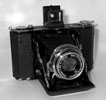 Zeiss
Ikon Ikonta B, catalog number 520/16. takes 6 X 6 exposures on 120 rollfilm.
Prewar model with Carl Zeiss Jena Tessar in Compur. This one has a small brass
plate on the backj that says "made for China" in Chinese characters.
Zeiss
Ikon Ikonta B, catalog number 520/16. takes 6 X 6 exposures on 120 rollfilm.
Prewar model with Carl Zeiss Jena Tessar in Compur. This one has a small brass
plate on the backj that says "made for China" in Chinese characters.
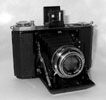 Zeiss Ikon Ikonta B, catalog number 521/16. 6 X 6 on 120 film, with 75/3.5 uncoated
Carl Zeiss Jena Tessar in Compur shutter. Double exposure prevention is a big
advance over model 520. Probably made in 1937, the first year of production
for this model.
Zeiss Ikon Ikonta B, catalog number 521/16. 6 X 6 on 120 film, with 75/3.5 uncoated
Carl Zeiss Jena Tessar in Compur shutter. Double exposure prevention is a big
advance over model 520. Probably made in 1937, the first year of production
for this model.
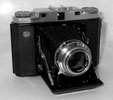 Zeiss Ikon Ikonta B 524/16 (Mess-Ikonta). Uncoupled rangefinder, coated Zeiss-Opton
Tessar 75/3.5 in Synchro-Compur shutter. Made in the early to mid 1950s by Zeiss
Ikon, Stuttgart.
Zeiss Ikon Ikonta B 524/16 (Mess-Ikonta). Uncoupled rangefinder, coated Zeiss-Opton
Tessar 75/3.5 in Synchro-Compur shutter. Made in the early to mid 1950s by Zeiss
Ikon, Stuttgart.
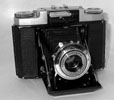 Zeiss Ikon Nettax 6 X 6 folder. Made in the mid to late 1950s by Zeiss Ikon,
Stuttgart. Coated 75/3.5 Novar lens in Pronto shutter. Built-in uncoupled selenium
light meter. There seems to be some confusion about the Zeiss catalog number
for these; apparently it was officially 513/16, but mine, and at least one other
I know of, say 534/16 on the back, which is the catalog number of the Super
Ikonta IV.
Zeiss Ikon Nettax 6 X 6 folder. Made in the mid to late 1950s by Zeiss Ikon,
Stuttgart. Coated 75/3.5 Novar lens in Pronto shutter. Built-in uncoupled selenium
light meter. There seems to be some confusion about the Zeiss catalog number
for these; apparently it was officially 513/16, but mine, and at least one other
I know of, say 534/16 on the back, which is the catalog number of the Super
Ikonta IV.
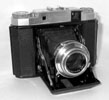 Zeiss Ikon Super Ikonta III, 531/16. Late 1950s, from Zeiss Ikon, Stuttgart.
6 X 6 on 120, with coupled rangefinder and 75/3.5 coated Zeiss-Opton tessar
in Synchro-Compur shutter. Still a very nice picture taker.
Zeiss Ikon Super Ikonta III, 531/16. Late 1950s, from Zeiss Ikon, Stuttgart.
6 X 6 on 120, with coupled rangefinder and 75/3.5 coated Zeiss-Opton tessar
in Synchro-Compur shutter. Still a very nice picture taker.
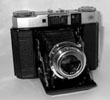 Zeiss Ikon Super Ikonta IV, 534/16. Late 1950s to very early 1960s. Coupled
rangefinder, built-in uncoupled selenium light meter, 75/3.5 Zeiss Tessar lens
in Synchro-Compur shutter. A beautiful, light, portable picture taker.
Zeiss Ikon Super Ikonta IV, 534/16. Late 1950s to very early 1960s. Coupled
rangefinder, built-in uncoupled selenium light meter, 75/3.5 Zeiss Tessar lens
in Synchro-Compur shutter. A beautiful, light, portable picture taker.
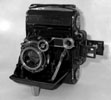 Zeiss Ikon Super Ikonta A, catalog number 530. Early to mid 1930s. Coupled rotating-prism
rangefinder, uncoated Carl Zeiss Jena Tessar 75/3.5 in Compur shutter. fold-up
optical, non-Albada, finder. Location of one red window makes using it with
pan film difficult.
Zeiss Ikon Super Ikonta A, catalog number 530. Early to mid 1930s. Coupled rotating-prism
rangefinder, uncoated Carl Zeiss Jena Tessar 75/3.5 in Compur shutter. fold-up
optical, non-Albada, finder. Location of one red window makes using it with
pan film difficult.
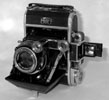 Zeiss Ikon Super Ikonta A, catalog number 531. Prewar, with uncoated 75/3.5
Carl Zeiss Jena Tessar. Coupoled rangefinder, Albada finder. Note the Zeiss-Ikon
nameplate, some have this, some have the more usual impression in the leather.
Note also the polished aluminum edges; this was done after the camera left the
factory, probably because the black enamel became chipped (very common problem).
In this case, and a few others I have seen, the removal of enamel and polishing
were done so nicely that it looks almost like it was meant to be that way.
Zeiss Ikon Super Ikonta A, catalog number 531. Prewar, with uncoated 75/3.5
Carl Zeiss Jena Tessar. Coupoled rangefinder, Albada finder. Note the Zeiss-Ikon
nameplate, some have this, some have the more usual impression in the leather.
Note also the polished aluminum edges; this was done after the camera left the
factory, probably because the black enamel became chipped (very common problem).
In this case, and a few others I have seen, the removal of enamel and polishing
were done so nicely that it looks almost like it was meant to be that way.
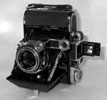 Zeiss Ikon Super Ikonta A, 531. Early-1950s postwar camera with 75/3.5 coated
Zeiss Opton Tessar in X-synced Compur Rapid shutter. Coupled rangefinder, Albada
finder. This one works but is not in very pretty cosmetic condition.
Zeiss Ikon Super Ikonta A, 531. Early-1950s postwar camera with 75/3.5 coated
Zeiss Opton Tessar in X-synced Compur Rapid shutter. Coupled rangefinder, Albada
finder. This one works but is not in very pretty cosmetic condition.
 Zeiss Ikon Super Ikonta C, 531/2. Early-1950s camera with coated Zeiss-Opton
Tessar 105/3.5 in X-synced Compur Rapid. Coupled rotating-prism rangefinder.
this is one of my favorite picture takers, folds up small, takes sharp 6 X 9
negatives.
Zeiss Ikon Super Ikonta C, 531/2. Early-1950s camera with coated Zeiss-Opton
Tessar 105/3.5 in X-synced Compur Rapid. Coupled rotating-prism rangefinder.
this is one of my favorite picture takers, folds up small, takes sharp 6 X 9
negatives.

Zeiss Ikon Ikoflex Ia. Early 1950s. This camera is equipped with the coated Zeiss Opton Tessar 75/3.5 taking lens and is capable of taking very nice pictures, despite being near the bottom of the Ikoflex line. This particular camera is in near-mint condition and was professionally CLAed recently, so it works very nicely.
All images and text on this site are copyrighted by Ross A. Alford and may not be reproduced without permission